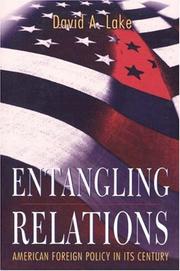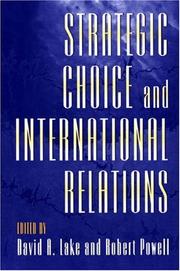| Listing 1 - 2 of 2 |
Sort by
|

ISBN: 0691216118 069105990X 0691059918 Year: 1999 Publisher: Princeton University Press
Abstract | Keywords | Export | Availability | Bookmark
 Loading...
Loading...Choose an application
- Reference Manager
- EndNote
- RefWorks (Direct export to RefWorks)
This text explores America's policy with regard to unilateralism after World War I, during the Cold War, and thereafter. The author shows how, after World War II, the United States broke decisively with tradition and embraced a new policy of cooperation with partners in Europe and Asia.
USA. --- USA --- USA. --- Aussenpolitik --- Geschichte --- Australia. --- Borah, William. --- Bush administration. --- Byrnes, James. --- Dulles, John Foster. --- Forrestal, James. --- Fox, Annette Baker. --- French Security Treaty. --- Great Debate. --- House, Colonel Edward. --- Iraq. --- Johnson, Hiram. --- Kennan, George. --- Kuwait. --- Lippmann, Walter. --- Lovett, Robert A. --- Marshall Plan. --- Morocco. --- Occupation Statute. --- Pacific perimeter. --- Roosevelt, Theodore. --- Saddam Hussein. --- conservative internationalists. --- decision theory. --- hegemony, American. --- multilateralism. --- neorealism. --- quasi rents.

ISBN: 0691213097 0691026971 069102698X Year: 1999 Publisher: Princeton University Press
Abstract | Keywords | Export | Availability | Bookmark
 Loading...
Loading...Choose an application
- Reference Manager
- EndNote
- RefWorks (Direct export to RefWorks)
The strategic-choice approach has a long pedigree in international relations. In an area often rent by competing methodologies, editors David A. Lake and Robert Powell take the best of accepted and contested knowledge among many theories. With the contributors to this volume, they offer a unifying perspective, which begins with a simple insight: students of international relations want to explain the choices actors make--whether these actors be states, parties, ethnic groups, companies, leaders, or individuals. This synthesis offers three new benefits: first, the strategic interaction of actors is the unit of analysis, rather than particular states or policies; second, these interactions are now usefully organized into analytic schemes, on which conceptual experiments may be based; and third, a set of methodological "bets" is then made about the most productive ways to analyze the interactions. Together, these elements allow the pragmatic application of theories that may apply to a myriad of particular cases, such as individuals protesting environmental degradation, governments seeking to control nuclear weapons, or the United Nations attempting to mobilize member states for international peacekeeping. Besides the editors, the six contributors to this book, all distinguished scholars of international relations, are Jeffry A. Frieden, James D. Morrow, Ronald Rogowski, Peter Gourevitch, Miles Kahler, and Arthur A. Stein. Their work is an invaluable introduction for scholars and students of international relations, economists, and government decision-makers.
Strategic planning. --- International relations. --- Axelrod, Robert. --- Bueno de Mesquita, Bruce. --- Chicken Game. --- Depew, David J. --- Fearon, James. --- Frieden, Jeffry. --- Hirshleifer, Jack. --- Keohane, Robert O. --- Lake, David. --- Lamarckism. --- Morrow, James. --- Rogowski, Ronald. --- aggregation of preferences. --- constructivist theories. --- deterrents: alliances as. --- ecology, organizational. --- hegemonic stability theory. --- linkage in bargaining. --- mathematical model. --- multiple-veto systems. --- reversion point. --- scale of units. --- screening.
| Listing 1 - 2 of 2 |
Sort by
|

 Search
Search Feedback
Feedback About UniCat
About UniCat  Help
Help News
News